- Home
- Patricia McLinn
Sign Off Page 5
Sign Off Read online
Page 5
He made a lot of arrests, though his conviction rate was low considering the volume. However, his paperwork was prompt and seldom criticized by the court. Perhaps for that reason, Sheriff Widcuff had assigned Redus as courthouse liaison a year ago, as general investigator for Ames Hunt’s office and a local judge.
That assignment meant Redus, though officially assigned to the O’Hara Hill station, operated independently.
“No supervision at all,” Aunt Gee said with stern disapproval. “And unless he was investigating the bedrooms of half the women in this county, he surely wasn’t putting in a full week’s work.”
“The sheriff didn’t say anything?” I asked.
“No.”
“How about the people he worked for at the courthouse?”
“Judge Claustel never took to having Redus around, so I would have been real surprised to hear he objected to any cause that kept Redus out of his sight. And I expect Ames Hunt is fully capable of not knowing anything he doesn’t want to know.” It took me a moment to unravel her syntax. “For someone prosecuting cases of people doing their worst to other people, he likes to hold himself above such. Always has wanted to be above the rest. Doesn’t surprise me that he’d choose not to know about Redus’ tom-catting.”
“Well, somebody must have missed Redus, because they got a search started when he disappeared, right?”
“Six days later.”
“Six days?” That hadn’t been in the official file. There’d been a gap between when Foster Redus had left Tom Burrell’s house and the time of Burrell’s arrest, but I thought it had been to gather evidence.
Apparently it first took a while for anyone to notice they were missing one deputy.
“Wasn’t he supposed to be on duty?” I asked. Aunt Gee nodded. “Nobody noticed?”
“Some noticed. Nobody much minded. Except Mona. She pestered me with a half-dozen calls about suppertime that Monday evening he went missing. I told her he’d come and gone, but that wouldn’t do. She kept calling.” Aunt Gee’s mouth folded in on itself. “Tying up the lines, I finally told her I’d write up a citation on her if she called one more time.”
“But how about officially? I mean, after a couple days, you’d think somebody in the sheriff’s department would miss him.”
“Didn’t miss him and didn’t miss tripping over that leather satchel of his. It might have gone longer if Marty Beck and Mona Burrell hadn’t started a screaming fight outside the Walmart in Sherman over which of them had tried to steal Redus from the other. Got a 911 call. The department had to break ’em up. When Marty and Mona calmed down and realized neither of them had Foster hidden away, they demanded the sheriff find him. Eventually they got a report that Redus had been on his way to have it out with Tom Burrell before he disappeared.
“Sheriff and some others went to talk to Tom, and he freely admitted fighting with Redus. The state lab found the blood in Tom’s place, and you know the rest.”
* * * *
“Michael! Michael Paycik, I want to see you.”
The thin fluting voice stopped Mike and his aunt as we left after a post-lunch scrub-down of the kitchen. It took me a moment to track the source of the voice to a figure at the screen door of the house next door.
“Michael, you and that young woman come over here. I want to talk to you. It’s about time someone took action, since the law enforcement establishment hasn’t seen fit to sort it out.”
Aunt Gee exhaled quickly, which I read as a sign of exasperation, but that could have been wishful thinking. Maybe I wanted the dispatcher’s complete command of her universe to have a chink in it.
The screen door opened, revealing its holder as a gray-haired, thin woman standing starkly upright in a vain effort to reach five-feet tall. She wore navy slacks, a white peter-pan collar blouse, a lemon cardigan and white running shoes with purple lightning bolts on the side. “You’ll come in for tea.”
“Thank you, Mrs. Parens, but we just finished lunch, and . . .” Michael made eye contact with the little woman, and his protest cravenly deflated.
“I’m returning to the sheriff’s office,” Aunt Gee pronounced, continuing to her car.
“That’s quite all right, Gisella, I prefer to talk to these two young people in private.” Mrs. Parens’ dismissal was unmistakable.
Aunt Gee said not another word. I uttered a hasty thanks for lunch, which she acknowledged with a regal nod through the open car window as she backed out of the drive.
Mike snagged my elbow and guided me toward the door. He performed a painfully correct introduction then added, “Mrs. Parens was my fourth-grade teacher.”
That explained a lot. I still quaked at the thought of Sister Mary Robert from fourth grade—and that was only for Saturday Catechism.
“I also taught Michael in seventh-grade civics and was the principal of the high school while he was in attendance there.”
As we followed Mrs. Parens’ straight back down a narrow hall, I gave Paycik a sympathetic look. Sister Mary Robert was a terror for one year. If she’d followed me like that I might have joined the army—or the circus. He rolled his eyes in response, then nearly ran me over as I came to an abrupt halt at the entrance to what I felt sure Mrs. Parens would call the front parlor.
Framed photographs covered every available inch of wall space. Two whole walls and part of a third were devoted to class photos, from well-scrubbed grade-schoolers of the fifties in black and white, to styles into the twenty-first century. A quick scan suggested that the remaining pictures covered the entire history of the region.
“My God—it’s a museum,” I muttered.
Mrs. Parens’ lips pursed slightly, but her expression showed mostly satisfaction. “Although your appreciation would be more aptly expressed without profanity, Miss Danniher, the sentiment is appropriate. However, I prefer to think of it as a classroom.”
She invited us to sit. Every chair in the room was uncushioned wood and straight-backed—a classroom all right.
“This really is an amazing collection. That’s . . . that’s Teddy Roosevelt, isn’t it?”
“Yes. President Theodore Roosevelt hunted in this vicinity in 1903 in conjunction with a trip to Yellowstone National Park.”
“And Buffalo Bill Cody?”
That earned me a look of approval. It also launched a résumé of the county’s history, illustrated by the photographs, some of them so far above her head that Mrs. Parens had to use a pointer with a rubber tip.
I had to bite the inside of my cheek at Paycik’s expression when she pulled that out.
He grimaced at me once when her back was turned, obviously not happy I’d encouraged Mrs. Parens’ lecture.
Too bad. He wanted to learn about being a journalist? Well, this was part of it. Listening. He heard a boring history lesson. I heard a potential story—admittedly with a lot of editing. The woman was a goldmine on regional history and had sharp insight to people.
“However, my reason for asking you both in was not to educate you on the history of Cottonwood County, even though you are a most receptive pupil, and Michael, I am certain, would benefit from a refresher course.” Mike started guiltily, and I swear I saw a glint of amusement in Mrs. Parens’ faded gray eyes.
With Mike tongue-tied, I asked the obvious. “Why did you ask us in, Mrs. Parens?”
“To find out what measures you intend to take in order to clear Thomas David Burrell.”
“We’re not trying to clear Burrell. We’re doing background on Foster Redus’ disappearance. I’m new in the area, and this is the biggest active story, so . . . . In fact, I’d be interested to know what you thought of Foster Redus.”
She shook her head as she removed a class picture from the wall. “I never met Mr. Redus, so I can add nothing to your information in that regard. But these people I do know.” She put the frame in my hands. “I know them all.”
“This is Thomas David’s graduation picture.” She pointed to a postage-stamp sized photo of a da
rk-haired, long-faced young man looking directly into the camera as if trying to see what was on the other side. “A fine mind. He should have gone on to university instead of taking over his father’s construction enterprise. He started university. He had a full scholarship. But he dropped his classes and returned home to marry.”
Her thin finger pointed to another likeness. “Gina Hawkins also had the potential for higher education, although she never believed in herself to the degree that would have allowed her to pursue it.” I glanced at a girl with long, reddish-brown hair screening most of a small face.
“Married to Redus,” Mike muttered, and I looked again, with more interest but no more result. There was little to see of Gina Hawkins Redus.
The picture next to hers caught my eye. “Ames Hunt,” I read from beneath it.
“Yes,” said Mrs. Parens. “He, too, was in that class. He and Thomas David were always at the head of their class—in activities as well as scholarship. Thomas David was class president, Ames was the vice president. Thomas David was captain of the basketball team, Ames was a reserve. Thomas David was valedictorian, Ames was salutatorian. Thomas David had great natural gifts, but Ames worked with dedication and meticulous planning to make the most of his skills.”
If I’d been Ames, Thomas David would have been a major pain in my derriere.
“Yet,” their former teacher went on, “Ames Hunt was the one who went on to university, to law school and has attained a position of political stature in our community.”
Ah, like the teenage bitch queen getting wrinkles, time can even out the score.
“Mona Praver . . .” Mrs. Parens spoke with judicial neutrality, “. . . had no interest in higher education. Or in anything beyond her pleasures.”
“She was very pretty.” I studied the smiling face under a shimmering fall of blond hair. It looked natural then.
Mrs. Parens’ lips pursed; I almost expected her to preach that pretty is as pretty does.
“She has been an adequate parent to Tamantha,” she conceded.
I must have looked surprised.
“I was called out of retirement last year,” Mrs. Parens said, “to teach a first-grade class because their teacher faced a long convalescence from an automobile crash. Tamantha Burrell was a member of that class.” She took the class photo from my hands and returned it to its spot on the wall.
“So you see,” she went on, her voice as clear with her back to us as facing us—a useful attribute for a teacher, “I am not relying solely on memories of these people as young students many years ago.”
I wasn’t sure that any of this advanced us, but it couldn’t hurt to ask about one other name, a name I’d forgotten about until now.
“Do you know someone named Rog Johnson, Mrs. Parens?”
Her hands stilled on the frame she had adjusted. “Yes.” With no further comment, she moved to a section of the wall bearing more recent photos.
I shot a questioning look at Mike. He barely got off a shrug before Mrs. Parens turned and placed another framed photograph in my hands.
“This,” she pointed with a tapered finger, “is Roger Johnson Junior before he started high school.”
The pictures were larger, and judging from hair and fashion styles quite recent. I saw a sandy-haired boy with a shy smile, a faintly worried look in the eyes. Even compared to the faces around him, he looked young and vulnerable. Mrs. Parens covered the first frame by placing two more on my lap, these from an earlier generation.
“But these are the people you need to talk to. Roger and Myrna Johnson.” She pointed to a young man in one class photo and a girl in another. “They married two weeks after Myrna graduated from high school, and had Roger Junior, their only child, five years later.”
I was mildly amused at her care in clarifying that Roger and Myrna didn’t, as they say, have to get married.
“I need to talk to the young man directly.” Since he’s the one Richard Alvaro’s obscure mutter had linked to Foster Redus.
“You can’t.”
I quickly calculated age. He could be away at college, I supposed. “Why not?”
“Roger Junior died a year ago. The day after Deputy Redus arrested him.” For the first time, Mrs. Parens’ voice faltered, as if she grappled with an unanswerable question. “He committed suicide.”
Chapter Five
“There’s a place here in O’Hara Hill, has the best burgers around . . .”
I gawked at Mike. “After what your aunt fed us?”
He grinned. “It’s where the locals go.”
I considered my options. I do legwork on my own. Not that I’d done much enterprise reporting the past few years. Making sure I’d covered the network on the stories everyone else would have and developing sources for those stories didn’t leave much time to wander off the well-worn path.
But Paycik had the connections.
“Tell you what,” I offered, “let’s look around town first. We could kill some time by talking to that deputy friend of yours.”
“Richard? Why—”
“Which reminds me. Blabbing to the sheriff’s department that I’m looking into the case not only isn’t accurate—” I hadn’t committed yet, at least not outside of my own head. “—it’s a great way to get a source fired.”
He snorted. “Aunt Gee could do a primetime special exposing every last detail of every last case there’s ever been in this county, and she wouldn’t get fired. Our sheriff’s not the brightest, but he knows Aunt Gee really runs the department. And if she hadn’t wanted the department to know, she wouldn’t have told me to bring you there first.”
Maybe. Gee certainly wouldn’t have hesitated to make her displeasure clear if she’d felt any, so that gave his take credence.
But if this was the way things worked in Cottonwood County, it left me in a reporting landscape nearly as different from what I was used to as the mountains were from skyscrapers.
“Besides, it’ll save time this way,” Mike added.
I gave him only a skeptical eyebrow lift.
He grinned. “People will start coming to us with information. We won’t have to go searching for them. Like Richard did with whatever he told you by the drinking fountain.”
My eyebrow lost altitude. His grin gained it.
“So,” Mike said with the self-satisfaction of a man who thinks he’s won a round, “what more do you want to find out from him?”
For starters, I wanted an explanation of Richard Alvaro’s expression when Mike said I wanted to know about the Foster Redus case. And why Richard had suggested I ask about a teenager who’d committed suicide.
* * * *
Mike said if Alvaro was patrolling on county roads it could take a week to find him. It took eight minutes of crisscrossing the town.
During those eight minutes, Mike told me O’Hara Hill had been born as a mining town. Wyoming had a history of boom and bust cycles in natural resources—coal, oil, natural gas, even bentonite and soda ash—while cattle ranching continued with its own highs and lows. When the mining company pulled out forty years ago, O’Hara Hill shrank, but held on as a supplier to nearby ranches and outfitters.
The marked sheriff’s department car sat in an otherwise empty church parking lot. Alvaro was finishing paperwork on a speeding ticket.
“So, you two—” His finger waggled from me to Mike and back. “—an item? Carol’s going to want to know.”
“No.” I might have made it too emphatic, because Alvaro’s smile immediately disappeared. “We want to talk with you.”
“Off the record.”
Off the record. My third-least favorite response from a source. Least favorite is no comment, which is even worse than runner-up go to hell.
“Okay. How well did you know Foster Redus?”
The smooth olive-tinted skin of Alvaro’s narrow face relaxed, and he closed the metal folder that held his forms. He’d braced for a tough question. That’s why I’d asked this one. It was good to know I h
adn’t forgotten everything.
“When I was a rookie, I rode with him a couple times.”
“When was that?”
“Not long after he joined the department—almost two years ago.”
“What did you think of him?”
“He’d brown-nose anybody he thought was higher than him. Anybody else, he talked to like they’re stupid or dirt or both. A bully by my thinking.”
“Did he treat you that way?”
“Yeah, but I expected it.” I wondered if that expectation came from Redus’ reaction to rookies or Hispanics. “Once, he stopped an old pickup, said it was weaving. I didn’t see that, but Redus said I must be blind. He started in talking to the woman driver like she didn’t have any brains or morals. She didn’t say much, but I thought she was steaming. Then, he looked at her driver’s license and suddenly got nice as could be. Turns out she’s a lawyer in Cody driving her brother’s ranch truck because her car wouldn’t start. ’Course Redus didn’t give her a ticket. I heard she complained to Sheriff Widcuff, but he didn’t do anything.”
“So, you didn’t care for Redus or the way he treated people, but that isn’t why you told me to ask about Rog Johnson, is it, Richard? What do you know about the boy’s suicide?”
Mike shot me a quick, puzzled look.
The tautness under Alvaro’s skin returned, and parallel lines over his nose tucked his dark brows in a frown. “Not much. He hung himself in a shed on his folks’ place.”
“What was he arrested for?”
Alvaro’s lips drew back over his teeth in distaste. “Disorderly conduct, public nuisance. Sounded to me like Redus doing his bully act, this time on a kid.” He looked toward the top of a lodge-pole pine standing sentinel by the church. “And when we heard about the boy, Redus laughed. Said the world wouldn’t miss one more candy-ass.
“There was something else.” Alvaro brought his gaze to us. “About a month after Redus disappeared, Sheriff Widcuff told me to clean out his desk. Wasn’t much, except one drawer with copies of case files. The one on Rog Johnson caught my eye. I looked through it—just copies of the official reports Redus filled out, charging Rog with disorderly conduct. Except one sheet. It had faint writing, like carbon from another sheet. That happens if you start writing straight on the pad instead of flipping the divider under the form.”

_preview.jpg) Almost a Bride (Wyoming Wildflowers Book 1)
Almost a Bride (Wyoming Wildflowers Book 1)_preview.jpg) Prelude to a Wedding (The Wedding Series Book 1)
Prelude to a Wedding (The Wedding Series Book 1) Reaction Shot (Caught Dead in Wyoming, Book 9)
Reaction Shot (Caught Dead in Wyoming, Book 9)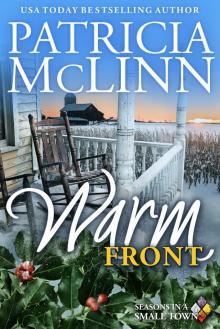 Warm Front
Warm Front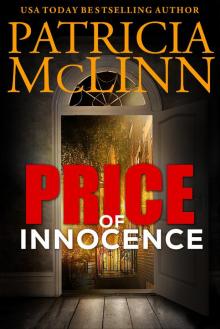 Price of Innocence
Price of Innocence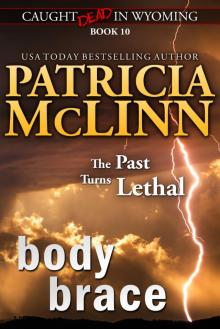 Body Brace (Caught Dead in Wyoming, Book 10)
Body Brace (Caught Dead in Wyoming, Book 10) Death on Covert Circle
Death on Covert Circle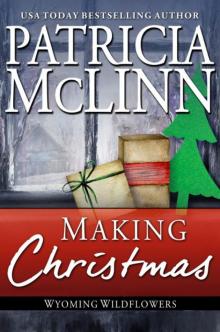 Making Christmas
Making Christmas Death on Torrid Ave.
Death on Torrid Ave.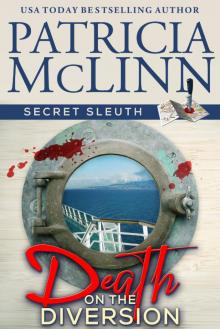 Death on the Diversion
Death on the Diversion The Rancher Meets His Match
The Rancher Meets His Match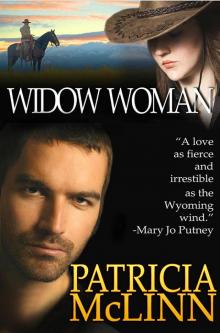 Widow Woman
Widow Woman The Runaway Bride
The Runaway Bride Hoops
Hoops A Stranger in the Family (Book 1, Bardville, Wyoming Trilogy)
A Stranger in the Family (Book 1, Bardville, Wyoming Trilogy)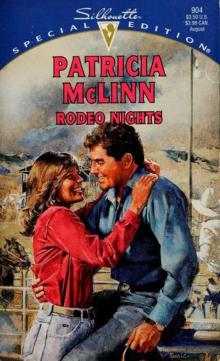 Rodeo Nights
Rodeo Nights Wedding Series Boxed Set (3 Books in 1) (The Wedding Series)
Wedding Series Boxed Set (3 Books in 1) (The Wedding Series) Sign Off (Caught Dead in Wyoming, Book 1)
Sign Off (Caught Dead in Wyoming, Book 1) Prelude to a Wedding
Prelude to a Wedding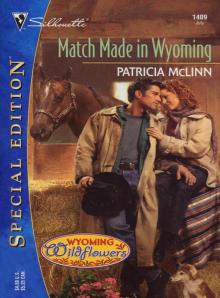 MATCH MADE IN WYOMING
MATCH MADE IN WYOMING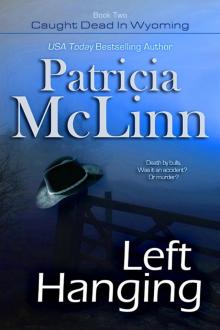 Left Hanging
Left Hanging What Are Friends For?
What Are Friends For?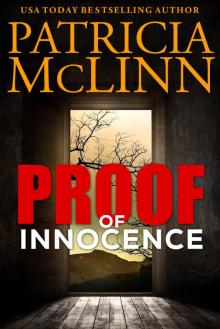 Proof of Innocence
Proof of Innocence Hidden in a Heartbeat (A Place Called Home, Book 3)
Hidden in a Heartbeat (A Place Called Home, Book 3) Baby Blues and Wedding Bells
Baby Blues and Wedding Bells Least Likely Wedding?
Least Likely Wedding? Heart Stealers
Heart Stealers Grady's Wedding
Grady's Wedding Right Brother
Right Brother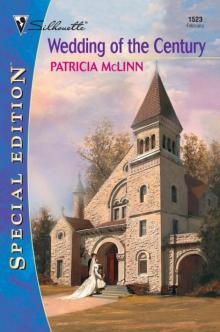 Wedding of the Century
Wedding of the Century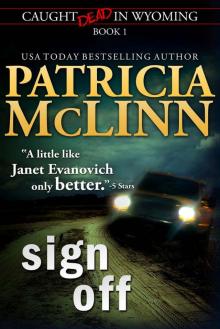 Sign Off
Sign Off The Surprise Princess
The Surprise Princess Wyoming Wildflowers: The Beginning
Wyoming Wildflowers: The Beginning